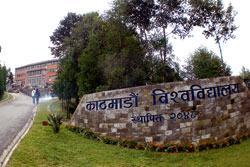|
|
Since it was formed by an act of parliament after the pro-democracy movement in 1991, Kathmandu University (KU) has been selective about students and faculty, and has aimed for excellence.
But, as with most institutions started with one man's vision, KU faces the same challenges as the nation itself: how to adjust to the new demands of a new generation.
When Suresh Raj Sharma got together with like-minded friends retired from academia, all they had was an idea. Today that idea stands in the form of a university that has more than 5,000 students in its departments and affiliated colleges.
"We all complain that the government doesn't do enough for us, but KU is the perfect example of what we can give back to the country," says the silver haired professor, who worked his way up from an impoverished Sindhuli village to get a PhD and devote his life to education, "The country made me what I am, I have no right to complain."
Sharma has always been a doer, overcoming obstacles to ensure that Nepal can provide an international standard university education so students don't have to go abroad to study. Today KU offers intermediate, undergraduate, graduate and postgraduate level programs in science, engineering, medicine, management, education, pharmacy, environment, music, human and natural resources, information technology, and biotechnology through six schools.
Sharma's biggest challenge is ensuring quality and he admits that he is worried about making sure that new departments like biotechnology and media meet the highest standards. KU has an enviable record of student retention (85 percent), three-fourths of all students have jobs within three months of graduating, and up to 20 percent go on to further studies.
"Just providing education is never enough," says Sharma, "we have to make sure that there are jobs out there for our graduates." Since 1998, the pharmacy department alone has produced 350 graduates who are the backbone of Nepal's budding pharmaceutical industry. KU-affiliated medical schools in Nepal save the country at least Rs 40 million a year in fees that would have otherwise have gone abroad, in addition to attracting medical students from abroad.
KU also has the only hydropower energy program in this part of the world, set up with Norwegian help. It is the perfect example of capacity building: setting up a hydropower training institute in Nepal instead of sending students to Norway. Other than Nepalis, 15 students from Indonesia, Sri Lanka, Zambia, and Bangladesh are also presently enrolled in the program.
Students come to KU because they want to study. With rigorous curricula and the pressure to do well, students have little time for politics, unlike in other universities. "My parents are paying so much money for me to study in KU, I came here because I want regular classes and I want to study," says Anuroop Manandhar, a fourth year biotechnology student.
Unlike other colleges, at KU it's not the students but the teachers who are on the warpath. Following the April pro-democracy uprising, faculty members at KU have been pressuring the administration to address long-standing grievances on promotion and job security. When the administration refused to allow staff to form a union in May, the university shut down for two weeks-the first time in its history.
Sharma concedes there may be legitimate demands, and says he is willing to consider them. But even for a chronic optimist like Sharma this episode has been a bitter reality check. "I gave it all I had, we made this institution brick-by-brick," he says, "it is very painful to see people trying to destroy what you have built so carefully."
Oddly enough, it was KU students who mediated between administration and agitating staff. "When the classes stopped we knew our semester calendar was going to be affected, so we pressured both sides to sit for talks and not fool around with our future," says Deepak Sharma, a student. The university accepted some of the demands, which are in the process of being implemented.
Perhaps now KU can go back to doing what it does best: using the next 15 years to build on the last 15 to produce a workforce of homegrown talent that is truly world class.



